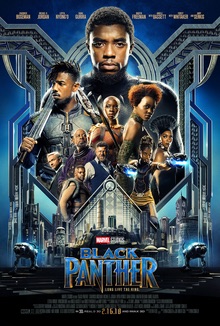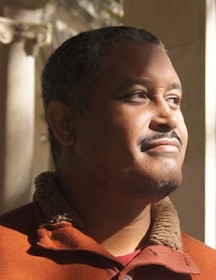By Benjamin Purper
Two months after audiences were transported to the fictional African nation of Wakanda, the hit superhero movie Black Panther continues to break records. The Marvel Studios film reached the status of the third highest-grossing film of all time, surpassing even James Cameron’s 1997 Titanic.
For Walter Greason (ΦBK, Villanova University, 1995), Dean of the Honors School at Monmouth University, Black Panther’s success isn’t just commercial—it’s also a defining moment for the artistic and intellectual movement known as Afrofuturism.
As Greason puts it, “Afrofuturism is about projecting a world where Africa has a vital role in how humanity continues to evolve and stretch its frontiers.” Greason says the term came about in the second half of the 20th century, at a time when “science fiction generally didn’t show people of African descent.”
“Somehow, all black people had vanished, or something terrible had happened,” Greason says of the science fiction stories of that time. “They didn’t survive, or they weren’t interacting in stories like Blade Runner or Star Wars, all these kinds of large productions that had become part of American culture.”
But that started to change towards the end of the 20th century, when writers like Octavia Butler intentionally brought Africans and African-Americans into the science fiction genre. Since then, Afrofuturism has grown and expanded into other mediums, culminating in what Greason calls our current Afrofuturist moment.
“That moment really crystallized in the Black Panther film, where between 20 and 40 years of literary and cultural production found its way into a large-budget film,” Greason says.

Black Panther’s unprecedented success—even among the other movies that make up the massively successful Marvel Cinematic Universe—is undoubtedly a crucial moment for Afrofuturism. “The global response, I think, is really hard to ignore,” Greason says.
But he’s cautious about what it means for the larger picture of race relations in America.
“In the era of Barack Obama’s presidency, I really had a lot of optimism that his ability to lead and to demonstrate his competency in that role would have basically persuaded a lot of people to believe in ideas like Afrofuturism, would give them more of a chance,” Greason said. “And I do think that plays a role in why Black Panther as a feature film has been successful.
“At the same time, the forces of the kind that resisted or reject those kinds of portrayals and the reality of the Obama presidency, that is a very real force, and we don’t talk enough about it.”
For Greason, those forces were epitomized in 2017’s Unite the Right rally in Charlottesville, Virginia, where white supremacists held a demonstration at the University of Virginia. Only days after the deadly event, Greason made public a syllabus that he used in a course on “Racial Violence in the United States” in 2002. The syllabus pulled together a comprehensive list of texts detailing the long history of events like the Charlottesville rally, and quickly attracted national attention.
More recently, Greason created another public syllabus, called the Wakanda Syllabus, an in-depth examination of the Afrofuturist literature and scholarship that culminated in the Black Panther movie.
Greason’s viral syllabi reflect one of his core academic principles: the value of liberal arts education.
“We’re at a moment where we’re seeing an unprecedented assault on liberal arts education,” Greason said. “We have to come together and stand, and begin to convince people that this turn towards specialization and vocational education and trying to make STEM the whole of what human inquiry is about—that’s wrong-headed. There’s a context that led to the kinds of breakthroughs and achievements that we’ve won.”
Greason is also a professor in the Department of History and Anthropology at Monmouth University, where he hopes to start a Phi Beta Kappa chapter. Greason describes the Society as the “fortress” protecting the legacy of the liberal arts.
“Phi Beta Kappa carries that torch, guards that tradition, and we must not let it be extinguished. We’ve got to stand up and state by state, town by town, and show them how spectacular the legacy is.”
Benjamin Purper graduated Phi Beta Kappa from the University of Redlands in 2017, having majored in international relations with minors in music and Latin American studies. University of Redlands is home to the Xi of California Chapter of Phi Beta Kappa.




